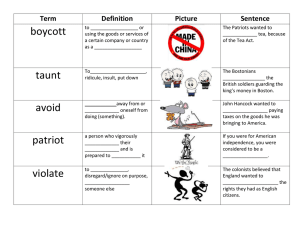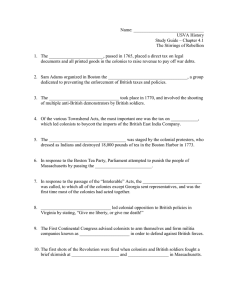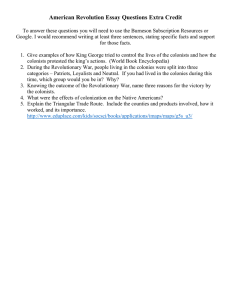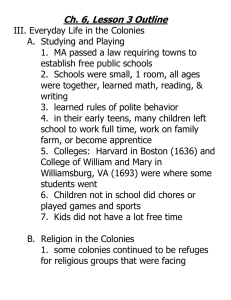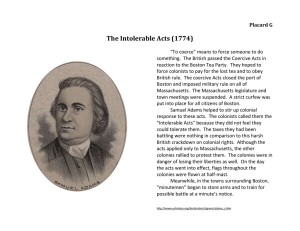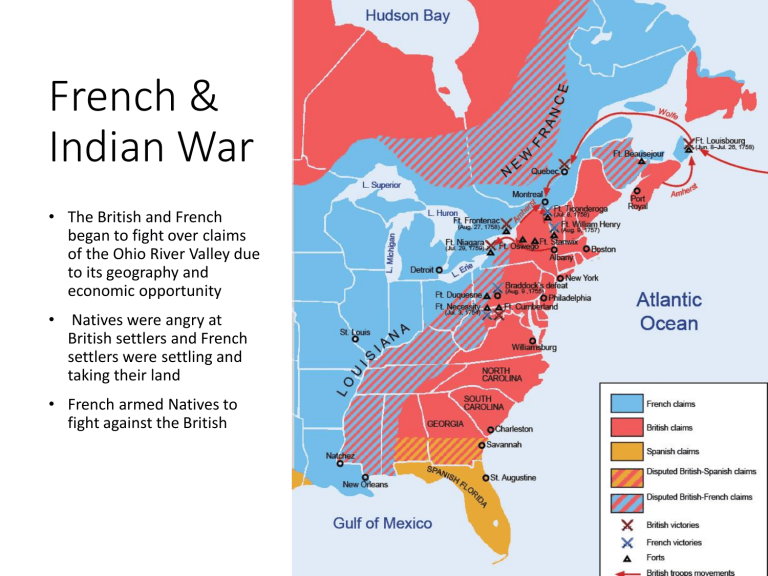
French & Indian War • The British and French began to fight over claims of the Ohio River Valley due to its geography and economic opportunity • Natives were angry at British settlers and French settlers were settling and taking their land • French armed Natives to fight against the British Views – French & Indian War British/Colonist – The French were invading the Virginia territory and we must protect our settlements French/Native – The British were expanding west and were ruining the land. We must protect the land What Happened? • British/Colonist won • British won all land EAST of the Mississippi River, including the Ohio River Valley and parts of Canada • French were kicked out of North America, except for in the Caribbean • George Washington’s name became recognizable Proclamation of 1763 • To keep colonists and Native Americans from fighting with each other the King George drew a line down the crest of the Appalachian Mountains. Settlers had to stay east of that line. Views – Proclamation of 1763 • British/Loyalists• Patriots- Tyranny, The Defending the frontier land was already is to expensive. settled, and it was the Colonists would have to only place farmers pay for troops could get new cheap land What Happened? 1 Most colonists ignored the new law and stayed put or continued to migrate pass the mountains. 2 The British army sent 7,500 men to keep peace on the frontier Sugar Act • Reduced tax on molasses from 6pence to 3pence • Increased Tax on imports of foreign (French) processed sugar. • Importing foreign rum was banned • Additional goods were being taxed and only between Britain and its colonies View – Sugar Act • British/Loyalist – • Patriots- Colonists were Colonists had been annoyed by the act ignoring the rules of because it marked the mercantilism by end of salutary neglect smuggling foreign sugar (limited role of British products. To help pay Government in the off the war debt, colonies). colonists had to purchase British products, not foreign products What happened? 1 Colonists openly protested the British Parliament's intervention in colonial affairs. The colonists believed that Parliament had absolutely no right to levy taxes upon them. "No taxation without representation" 2 Colonial merchants boycotted British goods 3 Colonists began to petition the British government to repeal the law. Following the initial letter written by Samuel Adams, many other letters were sent from different committees in response to the Sugar Act to get rid of the law. Stamp Act • The War debt from French and Indian War had to be paid • The law required all colonists to buy a stamp for every piece of paper they used. • Wills, licenses, playing cards, newspapers, deck of cards, etc. Views – Stamp Act • British and Loyalists – British citizens have been paying taxes on everything. The colonists are taxed the least, so why shouldn’t they pay off the debt of the French and Indian War • Patriots – “ No Taxation without Representation” Parliament had no right to pass a tax unless the colonists had a voice in Parliament (British Government). It is a violation of Rights What happened? 1 Colonists (Patriots and Loyalists) protested by sending petitions and appeals to Parliament or refused to buy the stamp 2 3 Sons of Liberty- A secret society led by Samuel Adams took violent action. Tarred & feathered tax collectors Stamp Act was repealed, but Quartering Act was issued. Colonies must provide food, shelter, and supplies to British soldiers. Was seen as another tax. Townshend Acts • Parliament passed a duty on certain goods the colonies imported from Britain to pay British debts. These goods included glass, paper, lead, ink, and tea Views – Townshend Acts • Loyalist/BritishBelieved that the colonists bad behavior made it more important to keep an eye on them. Colonists must pay for the Army sent there to protect them • Patriots – Duties were a tax in disguise. They violated colonists rights. “Taxation without Representation” What Happened? The Sons of Liberty organized a Boycott (refusal to buy British products). Boycotts were peaceful, everybody could support. Women (Daughters of Liberty) used home spun cloth, made tea from pine needles, and bought only American made products Duties were repealed because British merchants were losing money. Only TEA will be taxed Boston Massacre • Because of the increase of British troops in the colonies, tensions between the troops and colonists rose. Mob violence eventually breaks out. Patriots in Boston started throwing rocks and snowballs at British troops. British fire on rioters, five die, including Crispus Attucks Views – Boston Massacre • British/ Loyalist – It was • Patriots – used it as proof more troops were propaganda to stir up needed to control the people. It was proof Patriot hot heads that all troops need to leave colonies Colonial leaders used the killings as propaganda against the British What Happened? British soldiers were arrested and tried for the killings - John Adams was their defense attorney Led colonists to call for stronger boycotts against British goods Parliament repealed taxes on British imports, except for the one on tea Tea Act • After the Townshend Acts were repealed a tax on tea was left. British allowed the East Indian Tea Company to have a monopoly on tea in the colonies. American merchants could not set their own prices. Views – Tea Act • British and Loyalists – The British East Indian Tea Company needed to be saved. The boycotts have put it close to bankruptcy • Patriots – If they can place a monopoly on tea, what will stop them from doing it to other products What Happened? • Boston Tea Party- The Son’s of Liberty, led by Samuel Adams, dressed up as Indians and boarded a tea ship. They dumped 90,000 lbs. in Boston Harbor Intolerable Acts • They were designed to punish Massachusetts for the Boston Tea Party • More troops sent to Boston • Used Boston as an example for other colonies Intolerable Acts The Intolerable Acts were a series of Acts to punish Boston. It: 1. Closed the port of Boston – blockade 2. Took away the elected legislature of Massachusetts 3. All criminal trials in the colony were sent to Great Britain and heard under a British judge 4. Forced colonists to quarter British soldiers Views – Intolerable Acts • British and Loyalists- It • Patriots- If the King is no longer about Taxes could do this to one it was about British colony what will stop control of her colonies him from doing it to others. What Happened? • Colonies Unite- Other colonies support Massachusetts by sending aide. • First Continental CongressDelegates from 12 colonies met to discuss issues. They sent a message to the king and called for another boycott First Continental Congress • Americans were fed up. The "Intolerable Acts" were more than the colonies could stand. • Patriots throughout the colonies united and decided to meet to discuss what to do • On September 1774, the First Continental Congress was convened in Philadelphia. • George Washington, John Adams, Samuel Adams, Patrick Henry were all present Views – First Continental Congress Loyalists – right the wrongs King George put on the Colonies and repeal the Intolerable Acts Patriots – declare the rights and liberties of the Colonies and end the abuses of King George; declare independence A declaration of colonial rights was drafted and sent to London. What happened? Asked King George to repeal the Intolerable Acts Also made the decision to meet in May 1775 if their grievances were not addressed by the King or British government “Give Me Liberty or Give Me Death” • King George refused to repeal the Intolerable Acts • Virginia Colony met to discuss negotiate peace with King George • Patrick Henry, George Washington, Thomas Jefferson were all present at the Virginia assembly Patrick Henry’s Views • Long opposed the King’s taxes • At the First Continental Congress he argued the colonies unite and declare independence • Henry was convinced war was around the corner and Virginia must defend themselves militarily against the violations of their rights • Henry proclaimed in his speech, “The war is actually begun! […] I know not what others may take; but as for me, give me liberty or give me death!” What happened? Henry’s speech convinced others at the Virginia assembly to begin forming a militia Lexington & Concord • Colonies form militias and begin to stockpile weapons in armories • King George believes the colonies are in rebellion and sends troops to confiscate armories and weapons • Paul Revere warns militias of British Troops in Boston mobilizing Events of Lexington & Concord Cont. • Minutemen gather in Lexington to deter British • Gunfire is exchanged, which is forever known as the “Shot Heard Around the World” • Minutemen retreat to Concord • British go on to Concord. Minutemen engage and hold their ground. The British flee and retreat back to Boston. What happened? 1 Lexington and Concord is known as the first battle 2 Colonists won and proved they would fight for rights 3 American Revolution official begins Second Continental Congress • Lexington and Concord had changed everything • Proved the British were willing to use force against the colonists • Colonial leaders met May 10, 1775 once again in Philadelphia, Pennsylvania to decide what to do about the British Views - Second Continental Congress • Loyalist – extend an offer of peace to the King • Patriot – Benjamin Franklin, Thomas Jefferson, John Adams, George Washington, Samuel Adams all wanted to declare independence and create a Continental Army What Happened? In 1775 delegates compromised and sent King George an Olive Branch Petition, and formed the Continental Army, electing George Washington to command the army 1775 1776 After increased fighting with the British and no resolution in sight, the delegates decided to declare independence in 1776 Olive Branch Petition • Adopted at the Second Continental Congress in 1775 • The last attempt made by the Colonies to remain loyal to King George but assert they had rights as British subjects What happened? • Ultimately the King ignored the colonists requests and military battles between the British and the Colonies continued Common Sense • Ultimately the King ignored the colonists requests and military battles between the British and the Colonies continued • Many colonists were still afraid to jump towards declaring independence Thomas Paine’s Views • Published in January 1776 in Philadelphia, nearly 120,000 copies were in circulation by April • He argued for two main points: (1) independence from England and (2) the creation of a democratic republic. Common Sense grew the patriot cause What happened? In July the Second Continental Congress would finally declare independence from Great Britain Declaration of Independence • Far too much bad blood existed between the colonial leaders and the crown to consider a return to the past. More and more colonists felt deprived by the British not only of their money and their civil liberties, but their lives as well. Bloodshed had begun over a year ago and there seemed little chance of peace. Declaration of Independence • Thomas Jefferson was chosen to write the declaration • Benjamin Franklin and John Adams assisted Jefferson in writing the document • Declaration included: Unalienable Rights, Grievances against the King, and an official declaration of independence What happened? • The British Parliament and King George essentially refused to recognize the Colonies declaration of independence • War continued to be fought between the British and its colonies for 5 more years
